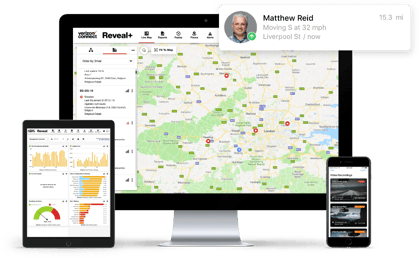9 Secrets to Reducing your Fleet Expenses
As a fleet owner, your day-to-day costs can quickly add up. What you don’t know is there are further hidden, expensive...
Read more
Safety remains at the top of the agenda for fleet-reliant business owners. As well as having to ensure the wellbeing of drivers, customers and other road users, there is also a compelling business case for safer driving.
A safer fleet is often a more productive and efficient one. The more diligent your drivers and well-maintained your vehicles, the less chance of accidents, vehicle downtime and costly repairs.
With stakes this high, it’s unsurprising that safety concerns are a common worry among fleet managers. In a Verizon Connect survey, carried out last year, fleet managers and fleet-reliant business owners put forward a range of concerns regarding their drivers in the field.
Among their worries were driver fatigue and driving behaviour, such as speeding, harsh acceleration and heavy braking. And they are right to be concerned. Driver behaviour is listed by the UK government as a leading cause of road casualties.
Other common concerns include the use of mobile phones while driving and failing to carry out vehicle checks.
What are your top three safety concerns about your drivers in the field?
Road safety is understandably at the forefront of every business owner’s mind. Of the fleets we surveyed last year, 71% had been involved in an accident in the previous 12 months.
The common causes were all too familiar, with driver behaviour, fatigue and distractions leading the way. As a result, many fleets reported vehicle downtime ranging from five to 15 days.
Which of the following has been the most common cause of accidents involving vehicles in your fleet in the past year?
Though it may not seem evident at first glance, there is one positive that can be taken from the statistics above.
Almost all of the leading causes of accidents are avoidable. The technology exists to monitor driver behaviour, improve driving habits and reduce the risk of accidents.
Modern GPS fleet management systems can help to make safety a top priority, creating coachable moments for drivers and alerting them to unsafe behaviours as soon as they occur.
However, many organisations are still failing to implement it.
Almost half of UK fleet managers do not use such technology to monitor and coach driver behaviour with over half failing to monitor and assess unsafe incidents on the road. On top of this, 57% do not use their GPS system to avoid adverse road conditions and 55% do not use it to assist with daily vehicle checks.
Do you use fleet management technology to assist you or your drivers in the following tasks?
With so many fleets around the country not using fleet management to its full potential, largely preventable accidents, caused by speeding, distraction and more, remain all too common.
The onus is on business owners to ensure drivers have the tools at their disposal to promote high levels of safety at all times. As well as triggering audible in-cab alerts to flag unsafe behaviours, a comprehensive GPS solution gathers vital data and insight that can be used to coach out such practices.
As well as helping to improve safety across the board, implementing a fleet management solution can help you to reduce insurance costs, lower fuel consumption, decrease wear and tear on your vehicles, and cut costly vehicle downtime. To find out more, download our safety eBook.
Tags: Safety




Find out how our platform gives you the visibility you need to get more done.
As a fleet owner, your day-to-day costs can quickly add up. What you don’t know is there are further hidden, expensive...
Read moreVerizon Connect Reveal tracks the fleet data that can have a big impact on your business. These are things like where...
Read moreAt Verizon Connect, we can only provide the highest possible level of service to fleet managers and business owners by...
Read moreReveal tracks the fleet data that can have a big impact on your business. These are things like where your vehicles are...
Read more